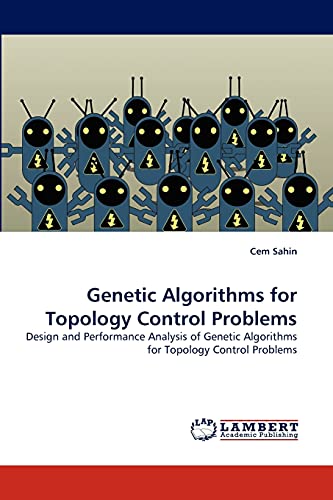Verwandte Artikel zu Genetic Algorithms for Topology Control Problems: Design...
Genetic Algorithms for Topology Control Problems: Design and Performance Analysis of Genetic Algorithms for Topology Control Problems - Softcover

Inhaltsangabe
This book present a bio-inspired topology control mechanism, force-based genetic algorithm (FGA), where a GA is run by each mobile node to achieve a uniform spread of nodes and to provide a fully connected network over an unknown area. We provide a formal analysis of FGA in terms of convergence speed, uniformity at area coverage, and Lyapunov stability theorem. This work also emphasizes the use of nodes to achieve a uniform distribution over an unknown terrain without a priori information. In contrast, each node running our FGA has to make its own movement direction and speed decisions based on local neighborhood information, such as obstacles and the number of neighbors, without a centralized control unit or global knowledge. The stochastic behavior of FGA makes it difficult to analyze its convergence speed. We built metrically transitive homogeneous and inhomogeneous Markov chain models to analyze the convergence of our FGA with respect to the communication ranges of mobile nodes and the total number of nodes in the system. The Dobrushin contraction coefficient of ergodicity is used for measuring convergence speed for the Markov chain models of our FGA.
Die Inhaltsangabe kann sich auf eine andere Ausgabe dieses Titels beziehen.
Reseña del editor
This book present a bio-inspired topology control mechanism, force-based genetic algorithm (FGA), where a GA is run by each mobile node to achieve a uniform spread of nodes and to provide a fully connected network over an unknown area. We provide a formal analysis of FGA in terms of convergence speed, uniformity at area coverage, and Lyapunov stability theorem. This work also emphasizes the use of nodes to achieve a uniform distribution over an unknown terrain without a priori information. In contrast, each node running our FGA has to make its own movement direction and speed decisions based on local neighborhood information, such as obstacles and the number of neighbors, without a centralized control unit or global knowledge. The stochastic behavior of FGA makes it difficult to analyze its convergence speed. We built metrically transitive homogeneous and inhomogeneous Markov chain models to analyze the convergence of our FGA with respect to the communication ranges of mobile nodes and the total number of nodes in the system. The Dobrushin contraction coefficient of ergodicity is used for measuring convergence speed for the Markov chain models of our FGA.
Biografía del autor
Cem ?afak ?ahin, Ph.D.: received his BS degree from Gazi University, Turkey in 1996, MS degree from Middle East Technical University, Turkey in 2000, and MPhil. and Ph.D. degrees from the City University of New York, USA in 2010, all in Electrical Engineering. He is currently with the Strategic Analysis and Testing team at American Express.
„Über diesen Titel“ kann sich auf eine andere Ausgabe dieses Titels beziehen.
Neu kaufen
Diesen Artikel anzeigenGratis für den Versand innerhalb von/der Deutschland
Versandziele, Kosten & DauerSuchergebnisse für Genetic Algorithms for Topology Control Problems: Design...
Genetic Algorithms for Topology Control Problems
Anbieter: buchversandmimpf2000, Emtmannsberg, BAYE, Deutschland
Taschenbuch. Zustand: Neu. Neuware -This book present a bio-inspired topology control mechanism, force-based genetic algorithm (FGA), where a GA is run by each mobile node to achieve a uniform spread of nodes and to provide a fully connected network over an unknown area. We provide a formal analysis of FGA in terms of convergence speed, uniformity at area coverage, and Lyapunov stability theorem. This work also emphasizes the use of nodes to achieve a uniform distribution over an unknown terrain without a priori information. In contrast, each node running our FGA has to make its own movement direction and speed decisions based on local neighborhood information, such as obstacles and the number of neighbors, without a centralized control unit or global knowledge. The stochastic behavior of FGA makes it difficult to analyze its convergence speed. We built metrically transitive homogeneous and inhomogeneous Markov chain models to analyze the convergence of our FGA with respect to the communication ranges of mobile nodes and the total number of nodes in the system. The Dobrushin contraction coefficient of ergodicity is used for measuring convergence speed for the Markov chain models of our FGA.Books on Demand GmbH, Überseering 33, 22297 Hamburg 136 pp. Englisch. Artikel-Nr. 9783844309027
Anzahl: 2 verfügbar
